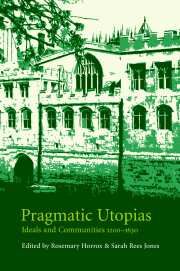Book contents
- Frontmatter
- Contents
- Preface
- List of abbreviations
- Richard Barrie Dobson: an appreciation
- 1 ‘If heaven be on this earth, it is in cloister or in school’: the monastic ideal in later medieval English literature
- 2 The ‘Chariot of Aminadab’ and the Yorkshire priory of Swine
- 3 Godliness and good learning: ideals and imagination in medieval university and college foundations
- 4 Hugh of Balsham, bishop of Ely 1256/7–1286
- 5 A cruel necessity? Christ's and St John's, two Cambridge refoundations
- 6 Coventry's ‘Lollard’ programme of 1492 and the making of Utopia
- 7 Thomas More's Utopia and medieval London
- 8 Social exclusivity or justice for all? Access to justice in fourteenth-century England
- 9 Idealising criminality: Robin Hood in the fifteenth century
- 10 Fat Christian and Old Peter: ideals and compromises among the medieval Waldensians
- 11 Imageless devotion: what kind of an ideal?
- 12 An English anchorite: the making, unmaking and remaking of Christine Carpenter
- 13 Victorian values in fifteenth-century England: the Ewelme almshouse statutes
- 14 Puritanism and the poor
- 15 Realising a utopian dream: the transformation of the clergy in the diocese of York, 1500–1630
- Bibliography of Barrie Dobson's published works
- Index
8 - Social exclusivity or justice for all? Access to justice in fourteenth-century England
Published online by Cambridge University Press: 01 July 2009
- Frontmatter
- Contents
- Preface
- List of abbreviations
- Richard Barrie Dobson: an appreciation
- 1 ‘If heaven be on this earth, it is in cloister or in school’: the monastic ideal in later medieval English literature
- 2 The ‘Chariot of Aminadab’ and the Yorkshire priory of Swine
- 3 Godliness and good learning: ideals and imagination in medieval university and college foundations
- 4 Hugh of Balsham, bishop of Ely 1256/7–1286
- 5 A cruel necessity? Christ's and St John's, two Cambridge refoundations
- 6 Coventry's ‘Lollard’ programme of 1492 and the making of Utopia
- 7 Thomas More's Utopia and medieval London
- 8 Social exclusivity or justice for all? Access to justice in fourteenth-century England
- 9 Idealising criminality: Robin Hood in the fifteenth century
- 10 Fat Christian and Old Peter: ideals and compromises among the medieval Waldensians
- 11 Imageless devotion: what kind of an ideal?
- 12 An English anchorite: the making, unmaking and remaking of Christine Carpenter
- 13 Victorian values in fifteenth-century England: the Ewelme almshouse statutes
- 14 Puritanism and the poor
- 15 Realising a utopian dream: the transformation of the clergy in the diocese of York, 1500–1630
- Bibliography of Barrie Dobson's published works
- Index
Summary
For this reason, I will keep myself within the woods, in the beautiful shade;
There is no deceit there, nor any bad law,
In the wood of Belregard, where the jay flies
And the nightingale sings every day without ceasing.
The outlaw, residing in the idyllic ‘wood of Belregard’, is a powerful and evocative image in medieval literature. Embodying a strong sense of social justice and imbued with utopian qualities, both the outlaw figure and the greenwood can be taken to symbolise the aspirations, or perhaps more appropriately the plight, of those who had no apparent prospect of ‘justice’, either through lack of access to the legal system or on account of their treatment within it. The apparent difficulties faced in trying to clear one's name are portrayed as stemming from endemic social prejudice and corruption within the legal system. As such, and in what is a recurring theme during the fourteenth century, the outlaw figure presents a picture of social exclusion amounting to a serious indictment of royal justice in late-medieval England.
This chapter seeks to mitigate the stark ‘outlaw's view’ outlined above (itself a metaphor for the excluded, both literally and psychologically) through an examination of attitudes towards the disadvantaged and by highlighting the structural and administrative factors ameliorating their experience of royal justice in the fourteenth century.
- Type
- Chapter
- Information
- Pragmatic UtopiasIdeals and Communities, 1200–1630, pp. 136 - 155Publisher: Cambridge University PressPrint publication year: 2001
- 1
- Cited by



